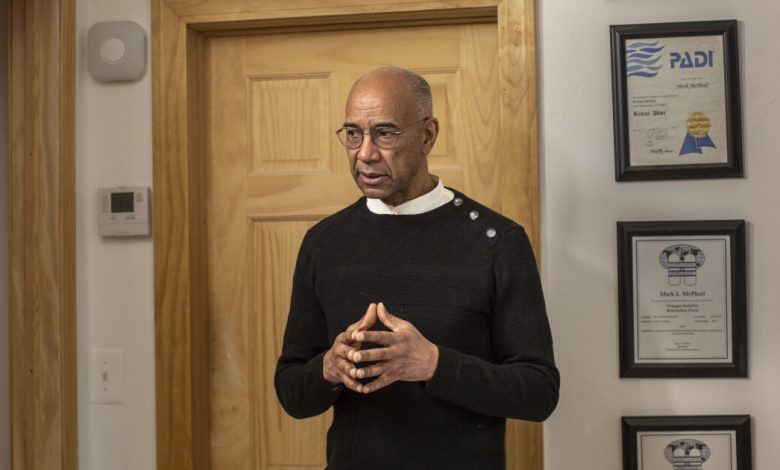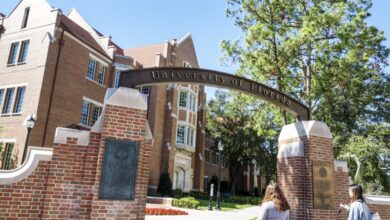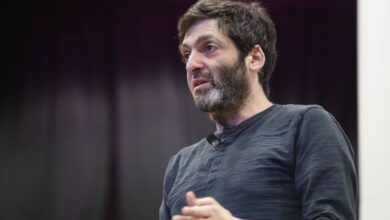He Was an Up-and-Coming Leader. Then His University Accused Him of Threatening Violence.

The officers handed him a letter. McPhail, a tenured professor of communication, had been fired, effective immediately. He was barred from stepping on campus property, the letter said.
The officers asked McPhail to give them his work property. He invited them inside and went upstairs for his work computer and some books.
When they left, he started sobbing.
The news was a shock, but it hadn’t come without warning. McPhail had spent the past month going back and forth with university administrators after they had reduced his salary and work load by 75 percent following a poor faculty review.
But his dismissal came with a surprising rationale: The professor had made “a threat of physical violence that we have no choice but to take quite seriously,” according to his termination letter.
McPhail was dumbfounded. What could they be referring to?
His firing has set some of his colleagues on edge. Objecting to what they see as a lack of due process, a faculty committee has concluded that administrators acted too harshly. McPhail himself has filed a lawsuit against the institution, alleging administrators violated his due process and discriminated and retaliated against him. In the suit, which is now making its way to federal court, McPhail says he believes he was retaliated against for being outspoken about his views of the campus’s racial climate.
For McPhail, once a senior administrator on the campus, the incident reminded him of a sense he’s had throughout his tenure, that this campus is inhospitable to Black students and employees. With his firing, the campus lost one of very few Black full professors.
Even the allegation carried an echo of the past. It wasn’t the first time someone on the campus had painted him as an angry Black man.
At the beginning of his second year in the Wisconsin job, McPhail had a performance review in the provost’s office. “I’m not trying to get rid of you,” McPhail recalled the provost, Beverly Kopper, saying. “But you’re going to make a great college president one day, and I’m going to do everything I can to make that happen.” (Kopper didn’t respond to an interview request.)
Kopper sent him to the Harvard Graduate School of Education’s Institute for Management & Leadership in Education, where the university brings together administrators from all over the country to discuss issues in higher education. He finished in 2013, and when an opportunity to work as an administrator at Indiana University Northwest arrived, he jumped at it.
This position would surely, he felt, keep him on the path to becoming a president.
When McPhail interviewed for the position of executive vice chancellor for academic affairs at Indiana, William J. Lowe, the chancellor at the time, assured McPhail he would have the “authority and responsibility to run the academic programs,” McPhail recalled. In the news release announcing his hire, the university said McPhail “will serve as an active and substantive contributor to the strategic direction of academic programs, continuous strengthening of academic excellence and effective day-to-day operation of the IU Northwest campus, as well as the advancement of Indiana University.”
He saw a chance to make a difference. Among his goals was to help the campus increase its involvement in the surrounding majority-Black Gary community. But obstacles quickly sprang up.
Lowe didn’t appear willing to give McPhail the authority he was promised. For instance, McPhail and Lowe disagreed on how to manage the School of Education. McPhail recalled that the interim dean there was overcommitted, straining the management of the school. So McPhail asked him to resign and picked another interim dean. That change “improved things,” he recalled.
But Lowe had another vision for the school. McPhail said that, at one point, Lowe wanted to turn it into a department only to realize he couldn’t when McPhail outlined the policies that he needed to go through beforehand. To McPhail, these breaches showed a lack of transparency and recognition of procedures.
Lowe had a reputation as a “consummate micromanager,” said Charles J. Hobson, a business-administration professor who was recruited by McPhail to be an interim dean of the School of Education and considers him a friend.

Lianne Milton for The Chronicle
“Any and all decisions had to be approved by him, even if they were in Mark’s area of responsibility,” he said. “If Mark did something and did not have approval from the chancellor ahead of time, he got called in on the carpet.”
Hobson recalls that he told McPhail many times, “I don’t know how you work for a man like that. I couldn’t.”
Lowe, who still works at IU Northwest as a history professor, didn’t respond to The Chronicle’s requests for comment.
McPhail had had enough. After six months, he submitted a letter of resignation. But Lowe wouldn’t accept it. Instead, the chancellor urged him to stay in the position, telling him that he would have the authority he desired to run the academic programs.
But similar difficulties persisted. One episode, which McPhail later recounted in an affirmative-action complaint, stood out. In late April 2016, McPhail met with Mark Hoyert, the dean of the College of Arts and Sciences. McPhail told Hoyert that his job performance hadn’t been meeting his expectations and that he would consider “initiating an internal search” to replace the dean if he didn’t step it up.
During that first meeting, McPhail expressed concern to Hoyert about two faculty members. One of them had failed to carry out his responsibilities as the head of a faculty committee, McPhail said, while another had said that “the faculty had the right to make up their own rules” about who got to sit on promotion and tenure committees, according to McPhail’s complaint. That contradicted a directive of Michael McRobbie, who became president of IU in 2007, who wanted to standardize rules for who got to sit on those committees.
McPhail wanted the dean “to address my concerns as part of his managerial responsibilities,” McPhail wrote in the document. Hoyert did not respond to The Chronicle’s request for comment.
But the next day, two administrators approached McPhail saying Hoyert told them that McPhail had fired him. At a meeting later that day, McPhail was told that several people were afraid of him and felt intimidated by him.
The next month, McPhail met with Lowe. The chancellor said he had heard similar complaints from faculty members about McPhail, and that he had received visits from several of them expressing concern about McPhail’s conduct in meetings.
“[Lowe] stated that these individuals had alleged, among other things, that I had created a climate of ‘discomfort,’ that they were ‘afraid to discuss’ their concerns with me, that I ‘did not listen,’ that I ‘jumped to conclusions,’ was ‘impatient,’ was ‘quick to anger,’ and that I was ‘heavy handed,’” McPhail wrote in his complaint.
McPhail was baffled. In the world of academe, where deference reigns, maybe what he characterized as his style of direct communication had ruffled feathers. He apologized to Lowe but said he sensed something rotten on the Northwest campus. The university’s recruitment and retention efforts, he wrote, “were being hampered by a climate of hostility toward African Americans on the IUN campus, and that while this was not a justification for my conduct, that the perception regarding my behavior may have been motivated by my public statements regarding the existence of such a climate.”
Shortly after that, McPhail decided to resign. This time, Lowe accepted it. Shortly after that, McPhail moved into his role as a tenured professor of communications.
The next month, he filed his complaint to the university’s Office of Affirmative Action & Employment Practices, alleging that he had faced “salary inequities and a pattern of racial hostility” at the university. According to the university’s policy, when a discrimination complaint is filed, the standard practice is to conduct an investigation and provide a resolution. McPhail says his sister attended a mediation with IUN administrators on his behalf, but, unsatisfied with the result of the meeting, he passed the complaint on to the federal Equal Employment Opportunity Commission’s Indianapolis District Office. That body, he says, claimed to have conducted an investigation, but McPhail says when he asked for a copy of the investigation, he never received one. The Chronicle asked the Indianapolis District Office to see a copy of the investigation but was told that because discrimination charges are confidential, the office couldn’t confirm or deny anything about the case.
In a letter to the Indianapolis office, the university denied McPhail’s claims. “The University conducted a thorough investigation of this complaint and found no evidence of racial discrimination or a hostile work environment,” the letter read. The university described Lowe’s remarks to McPhail as “constructive criticism” and said one of his duties was to maintain a positive relationship with the faculty. To the charge of “salary inequities,” the university said McPhail’s starting salary was only $6,000 less than that of his predecessor, who had been more qualified for the role.
McPhail’s stint as an administrator had ended in disappointment, and everybody knew it. When an administrator departs at Northwest, they get a farewell celebration in their honor, Hobson said. In McPhail’s case, however, no administrators arranged it. So Hobson hosted a get-together at a local restaurant as a going-away function for McPhail, extending select invitations to people who he knew liked and supported McPhail.
“He was not embraced, unfortunately, by the larger campus,” Hobson said. “I liked him. He’s a friend. I liked working for him, and it has crushed me to see what has happened to him.”
As an administrator, he had served as the university’s appointee on the Gary Commission on the Social Status of Black Males, a group that studies the social conditions of the city’s Black male population. He continued doing similar work, appointed by the president of the Urban League of Northwest Indiana, researching Black college students in the city. And he saw troubling signs.
But the student experience at IU Northwest, a commuter campus, can be hard to assess. There are no residence halls, so students usually just stop by, go to their classes, and leave. Similarly, faculty members generally have a two-day-per-week teaching schedule and typically are not on campus the days they’re not teaching.
Yet according to a campus-climate survey of employees from 2013, 30 out of 70 respondents felt like they observed favoritism toward one or more individuals in their unit because of their race/ethnicity. Nineteen out of 46 said they felt isolated or unwelcome at IU Northwest because of their race/ethnicity. Sixteen out of 48 respondents said they experienced discrimination on campus because of their race/ethnicity.
That’s a small sample size. But during his time on campus, McPhail heard from other Black faculty members who were having similar experiences and expressing the same concerns.
In an email to McPhail in his first year at IUN, Rochelle Brock, a Black woman who had formerly served as the executive director of the Urban Teacher Education Program at IU Northwest, described her last four years at the institution as “extremely stressful and disappointing.” She added that the administration disrespected Black students, faculty, and staff. She said she experienced hostility from other faculty members and, over her eight years at Indiana, had witnessed Black colleagues “forced into retirement, overlooked for tenure and/or promotion, unfairly dismissed and their knowledge and expertise ignored.”
Her experience there made it “emotionally necessary to look for other employment.” After she left IU Northwest, she became a faculty member at the University of North Carolina at Greensboro. Brock passed away in 2020 following a multiyear battle with cancer.
Hobson, who is white, says that while he hasn’t seen evidence of racial discrimination on campus in the 41 years that he has been there, he has heard from Black faculty members that they experienced microaggressions. McPhail once told his friend that he had experienced more microaggressions on Northwest’s campus than at any other institution he had worked in before.
The university has acknowledged room for improvement. In 2018, McPhail helped organize a public event in the university library to discuss how IU Northwest could do a better job reaching, retaining, and graduating more minority students. The event featured a panel of lawmakers and a presentation by McPhail. During the event, Suzanne Green, an administrator in the School of Public and Environmental Affairs, told lawmakers she had seen a drop in Black students in recent years. One community member told the panel, “I talk to so many kids, they don’t feel like they are welcome on this campus.”
The six-year graduation rate for Black students at IU Northwest has hovered around 10 percent in recent years, according to federal data — well below the state’s rate of 34 percent, as of 2018, for Black students. The overall six-year graduation rate at Northwest is 32 percent, according to federal data.
Following the forum, Lowe released a statement saying IU leadership was familiar with the data for degree completion for Black students at IU Northwest and that administrators were working to improve it, according to Gary 411 Weekly News. Lowe attributed the campus’s decline in population to the state’s decline in high-school graduation. “After high school, many college-eligible students who are African American have high financial need and, because of the abundance of jobs, choose to go to work.”
“There are fewer African American students enrolled, but their numbers are still proportionate to the African American population of the region,” Lowe said, according to 411 Weekly News. The chancellor added that the application rates and acceptances for Black students had also increased over the past several years.
But McPhail wasn’t buying it.
“It’s not what the data shows you,” McPhail said. “The data shows you that you’re doing nothing.”
The Chronicle sought interviews with administrators about the climate for Black students and employees at Northwest, as well as about McPhail’s case. The university declined those interviews. Chuck Carney, a university spokesperson, noted that last fall, Pamela Whitten, IU’s president, announced a $30-million initiative to increase the diversity of the faculty across all IU campuses as part of a series of initiatives for IU’s antiracist agenda. He added that recently, IU Northwest became the first and only comprehensive, public higher-education institution in the state to be recognized as a Hispanic-serving institution by the U.S. Department of Education. The campus has also added a faculty liaison whose role is to help faculty of color strengthen their sense of belonging at IU.
By the time the professor returned to Gary in the fall of 2020, Covid-19 had completely changed teaching.
A faculty evaluation dated July 2021 paints an unflattering portrait of McPhail’s return to the classroom. Over half of his students in the two fall courses he taught had gotten F’s, D’s, or withdrew, according to the evaluation, far higher than the rest of his department. In the spring, that rate ticked up even further. But the alleged shortcomings didn’t stop there. “It has been reported that students are avoiding enrolling in Dr. McPhail’s classes due to his reputation as a teacher,” the document said, reporting class sizes as low as five students. His student evaluations were largely critical, and he had apparently conducted two of his spring classes online when they were supposed to be in person. Finally, McPhail had apparently not contacted the only two students enrolled in a high-school dual-credit course, leaving them confused and forced to leave his section of the class.
McPhail says his evaluation wasn’t comprehensive. When he returned, he had trouble getting his class assignments from David Klamen, his dean. (Klamen didn’t respond to a request for comment.)
It was March 2020 and McPhail was growing frustrated. He had already contacted his department twice to inquire about his teaching assignments for the fall and had gotten no response, according to an email correspondence with Vicki Román-Lagunas, who succeeded McPhail as executive vice chancellor for academic affairs.
She apologized for the delay. “This Covid 19, as you can imagine, has created havoc for Indiana University,” Román-Lagunas said to McPhail via email. “We are doing our best to manage new decisions every day.”
Two months later, McPhail was following up again. He said he still hadn’t received any further information regarding the classes he would be teaching in August. He even tried, to no avail, to transfer to the Bloomington campus. By late June, McPhail’s requests had finally been brought to Klamen’s attention, but he didn’t get his class assignments until July.
“They never actually told me my teaching assignment; they just assigned me courses,” McPhail told The Chronicle.
At the time, he reached out to a colleague at IU Bloomington to double check whether what he was experiencing was out of the norm.
Carolyn Calloway-Thomas, a professor and chair of Department of African American and African Diaspora Studies at IU Bloomington, replied that what McPhail was experiencing was strange. “At IUB, the ‘best practice’ is for chairs and deans to consult with faculty members regarding their course portfolios. Occasionally, a wayward chair will assign faculty classes without consulting with ones who will teach them, but this is a rare bird, indeed,” she replied.


Still, McPhail went on to teach his classes, some completely online and others hybrid. He admitted that teaching courses over Zoom was tough. Some students were simply not showing up to class, and those who did kept their cameras off and remained on mute. “I was struggling like everybody else was with Covid and just trying to do the best I could to get my students educated,” he said.
When he received the evaluation, which also rated his service as inadequate, McPhail took issue. In a written response, he disputed its claims. How could he be blamed for poor grades? “I cannot in good conscience give students passing grades who have not completed assignments correctly or submitted required work,” he wrote. As for the classes he’d held online, he said he requested the proper approvals, but receiving no response, decided with his students to conduct the instruction online. He said the claim that he’d never contacted two students was incorrect. According to his records, there had only been one student enrolled in that course, and she completed it with a B grade. And McPhail disputed the notion that his service was subpar; in fact, he’d only been offered one service opportunity in 2020-21, he wrote, “but was told that someone else has been assigned the appointment when I agreed to serve.”
But the dean wasn’t buying it. Klamen criticized McPhail’s response — most notably, the professor’s claim that his students earned their bad grades. “I find it inappropriate that you attempt to shift blame to students for your own professional shortcomings.” Not only was it distressing to the dean, but he viewed it as a violation of the university’s Code of Academic Ethics. In light of that, he said, he was recommending that McPhail’s teaching duties be removed and that he only be paid for research — just 25 percent of his current salary. (The professor’s evaluation acknowledged that his research activity was good. He had published one book chapter and one journal article during the year, which was “a respectable research record for a senior faculty member.”)
Román-Lagunas, the executive vice chancellor for academic affairs, agreed, and broke the news to the professor in August.
The news came as a shock to McPhail. Widely adopted standards from the American Association of University Professors state that disciplinary action like a suspension only be carried out after a faculty committee has had the chance to review the matter. Indeed, the campus has a post-tenure review process that would do just that.
McPhail sought advice and assistance from the AAUP. In August, the organization wrote to the campus chancellor, Ken Iwama, on McPhail’s behalf requesting that he be “afforded an adjudicative hearing of record before an elected faculty committee in which the administration would have the burden of demonstrating adequate cause for suspension.” But they heard no response.
Román-Lagunas did present McPhail with the opportunity to appeal the suspension to the Faculty Board of Review, which he did.
Had the process continued like this, McPhail might still have his job. That’s not what happened. Distressed, McPhail placed a call to his friend, Hobson.
At some point he uttered a fateful remark: “if the Indigenous people had killed all the early white settlers, racism would not have established itself in the Americas,” a faculty review later found.
McPhail elaborated on what he meant in an interview. “I was basically talking about the fact that when colonists came here, they made agreements with the Native Americans, and then they betrayed those agreements,” he recalled. “If Native Americans had been less welcoming of the settlers and colonists, then we probably wouldn’t be in the situation we’re in today.”
McPhail was discussing history, comparing what had happened to the Native Americans with what he believed was the culture at IU. “It’s a culture that’s built around broken promises, broken treaties,” he said. The comparison may seem strained, but the professor saw parallels. When he first arrived at IU, McPhail says, he was promised the authority and responsibility to run the campus’s academic programs. But that’s not what happened. “Everything that the university provided me in terms of the position indicated that that would be the case,” he said. “It was not the case.”
He was confiding in a friend. He wasn’t expressing anger, and he wasn’t making any threats, Hobson recalled. Following their conversation, Hobson contacted Cynthia Roberts, the dean of the School of Business and Economics, in hopes that she could connect him with university administrators to speak on McPhail’s behalf.
Hobson didn’t think that McPhail was violent, but worried that his fragile emotional state may result in “harm to self or others,” according to Roberts’s recounting to faculty members considering McPhail’s case. Roberts herself didn’t feel threatened when she spoke with Hobson about what McPhail said. But she told the faculty board, according to its report, that “McPhail had said that the solution to racism is to kill all white people.” Roberts didn’t respond to The Chronicle’s request for comment.
McPhail and Hobson, the only two people on the call, reject Roberts’s characterization of their conversation. A brief, if jarring, historical aside had morphed into something much more sinister and inflammatory.
That’s how administrators viewed it. They considered McPhail a threat, and sent news of his termination to his house with three police officers. McPhail had made a threat of violence “on more than one occasion,” the letter said, and it didn’t matter whether it was “express or implied”; it merited his firing.
The only avenues left to the professor were the appeals processes. He had already appealed his suspension; now he appealed his firing.
The Faculty Board of Review, in considering the appeal of his suspension, found that the administration had improperly used the Code of Academic Ethics instead of the post-tenure review process to deal with McPhail’s behavior. It recommended his reinstatement.
Months later, the same board took up the matter of his firing, assessing the validity of his alleged threats and whether IU Northwest followed proper dismissal procedures. They found last month that McPhail’s allegedly threatening remarks “probably went near the topic of killing white people or killing all white people” and warranted an investigation. But the decision to fire McPhail was “not warranted by our campus’s policies and procedures,” according to a letter from the board to Román-Lagunas.
Klamen told faculty-board members, according to the report, that he had been warned to “take precautions against possible violence by McPhail” by Bala Arshanapalli, the associate executive vice chancellor in the office of academic affairs, and an IU attorney. Arshanapalli didn’t respond to The Chronicle’s request for comment.
But Klamen’s interpretation of the events didn’t exactly align with what Arshanapalli told board members. While Arshanapalli did describe McPhail as upset, frustrated, and angry during the course of a call between them following his salary and teaching reduction, he also said McPhail “didn’t say anything inappropriate” and “did not make any threats against Klamen or anyone else.” The report also restated Hobson’s claim that McPhail made no threats.
The faculty board found that no charges for making threats were ever filed to the police against McPhail. And, according to the group, suspension and a temporary ban from campus would have been effective means of protecting the campus community.
“Immediate dismissal was not the only protective option available in the circumstances,” they wrote in their decision letter. “The Dismissal Procedures contemplate suspension, not immediate dismissal, as the protective option of choice.” They also said that because McPhail had been immediately dismissed and barred from calling anyone at IU, he wasn’t granted any opportunity to defend himself properly against any of the accusations being made against him.
The board recommended that McPhail be reinstated, that his salary be restored, and that he be given back pay. The group seemed to acknowledge that the relationship between McPhail and the campus may be strained beyond repair, but said the university should “reach a settlement” with McPhail to formalize his departure.
The AAUP has also petitioned the university on McPhail’s behalf. Mark Criley, a senior program officer, wrote in April to Iwama, the chancellor, protesting a lack of due process. Giving McPhail the opportunity to file “a post-dismissal appeal of a unilateral administrative action” was “not an acceptable substitute for a prior dismissal hearing at which the administration must offer specific charges and must bear the burden of demonstrating that the charges are true and that they warrant dismissal,” he wrote. “It is essential that the Indiana University Northwest administration provide its faculty this indispensable safeguard of academic freedom: failure to do so effectively renders tenure all but meaningless at the university. This is a matter of grave concern to our association.”
In a more recent letter, Criley told Iwama that the organization would consider launching an investigation of the firing “unless the next several weeks bring either a satisfactory response to the concerns we have raised or news of a suitable resolution.”
A university spokesperson told The Chronicle that Iwama couldn’t comment on the ongoing case. The university has already rejected McPhail’s appeal of his suspension. In a January letter to McPhail, Iwama said administrators acted correctly in dismissing him under the Code of Academic Ethics rather than the post-tenure review process, which would afford McPhail more protections. Why? He had chosen not to remedy his “longstanding” deficiencies, the chancellor wrote, and that choice was a violation of the code.
McPhail’s appeal of his firing is still pending.
The situation has climbed the rungs of university leadership. In an August letter to Whitten, the system president, a faculty member aware of McPhail’s story voiced concern that the way IU Northwest’s leadership has handled McPhail will reflect poorly on the institution.
“My fear is that if this case is not resolved in an amicable and just manner, it will not only bring mental anguish to Dr. McPhail, but also damage the precious image and reputation of Indiana University, and at a crucial moment, when the university is most attentive to civic sensibilities and human flourishing,” wrote Calloway-Thomas, the Bloomington professor McPhail contacted about his fall course schedule.
McPhail hasn’t waited for administrators to reverse course. In April, he filed a lawsuit against the university, alleging that administrators violated his contract by not following its own policies, violated his free-speech and due-process rights, and engaged in racial discrimination.
McPhail’s case has also attracted attention from the Foundation for Individual Rights in Education, which argued that the “threat of violence” IU Northwest administrators used to justify McPhail’s termination is protected under the First Amendment.
“Rhetorical hyperbole, or even the endorsement of violence, does not exclude a particular statement from constitutional protection,” FIRE said in a statement.
McPhail’s fate has been sobering. His friend Hobson had always imagined that McPhail was just passing through IU, a pit stop during what he saw as a long and fruitful career.
“I assumed he’d be with us for a couple of years and then go on to be a chancellor at a bigger school or potentially a president at a smaller school,” Hobson said. “Now his career is in ruins.”
Source link






